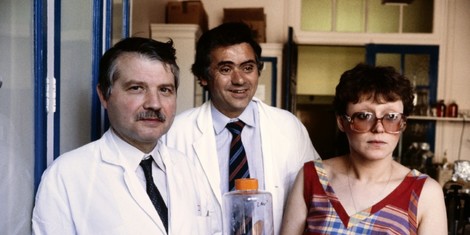French researcher Françoise Barre-Sinussi saw the discovery of the pathogenic AIDS virus 40 years ago, in which she was very involved, as a medical and personal turning point. Barry-Sinussi said in an interview with Agence France-Presse that the discovery of the life-threatening virus in 1983 launched a “race against time”. “Since then we had a huge construction site,” where many unanswered questions about the causative agent of AIDS had to be researched at the same time.
“We had to learn everything about it,” Barry-Sinussi said of the newly discovered virus: what proteins does the AIDS pathogen consist of, what is its genetic blueprint, what cells does it affect, and what are the consequences of infection?
With so many infections and deaths from AIDS worldwide, time was short to develop testing for AIDS and find effective treatments for HIV. So she and her colleagues had to bring researchers from other disciplines and infected patients on board.
In January 1983, under the direction of Luc Montagnier, Barry-Sinoussi and her colleague Jean-Claude Scherman isolated a previously unknown virus at the Pasteur Institute in Paris, which they named LAV. They said at the time that they believed the virus “could be involved”. Their discovery was published in the journal Science on May 20. In 1986, the pathogen was called human immunodeficiency virus, or HIV.
In 2008, Montagnier and Barry-Sinussi were awarded the Nobel Prize in Medicine for their discovery. Research on the HI Barré-Sinoussi virus changed his life in other ways, too. “In the early days, I was a researcher who never left her laboratory,” she told AFP. Later, however, she dealt extensively with AIDS patients and experienced things “that I would never have thought possible—such as the public’s intolerance of certain populations.”
“At that time, patients were stigmatized by their family, friends and sometimes even health care workers,” says the Frenchwoman, recalling the early years of the AIDS epidemic. “Some have lost their homes and jobs.” And through contact with AIDS patients, she “learned a tremendous amount about the inequalities, which may unfortunately have been exacerbated in today’s rich countries.”
© 2023 AFP







More Stories
Exploding Fireball: Find the meteorite fragments
Neuralink's competitor lets blind people see again with an implant
A huge meteorite has hit Earth – four times the size of Mount Everest